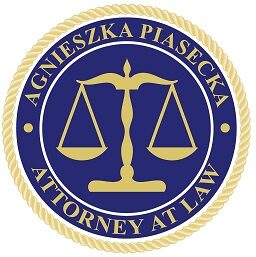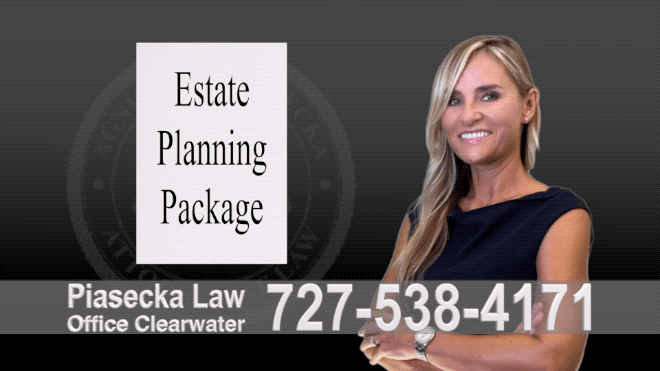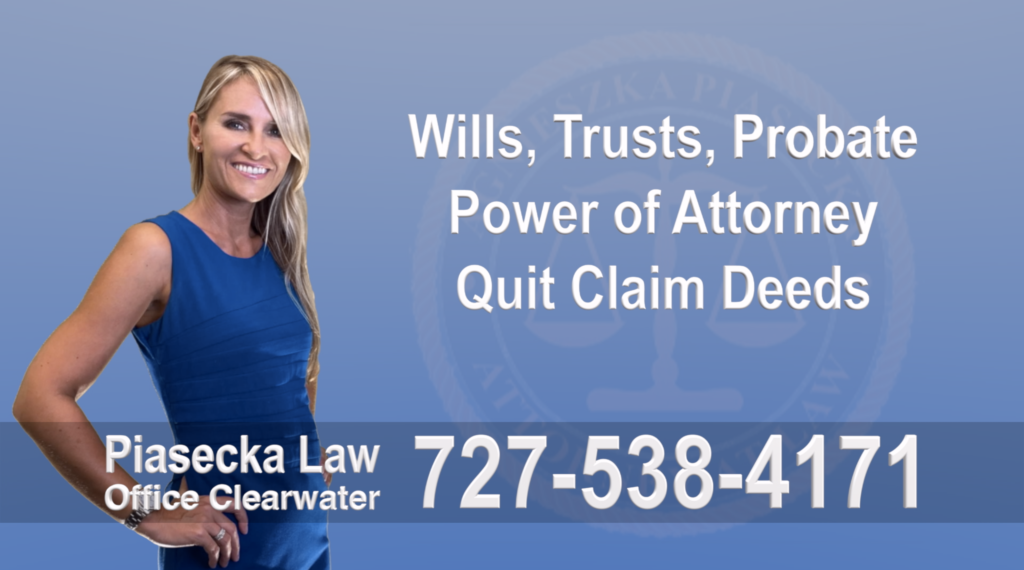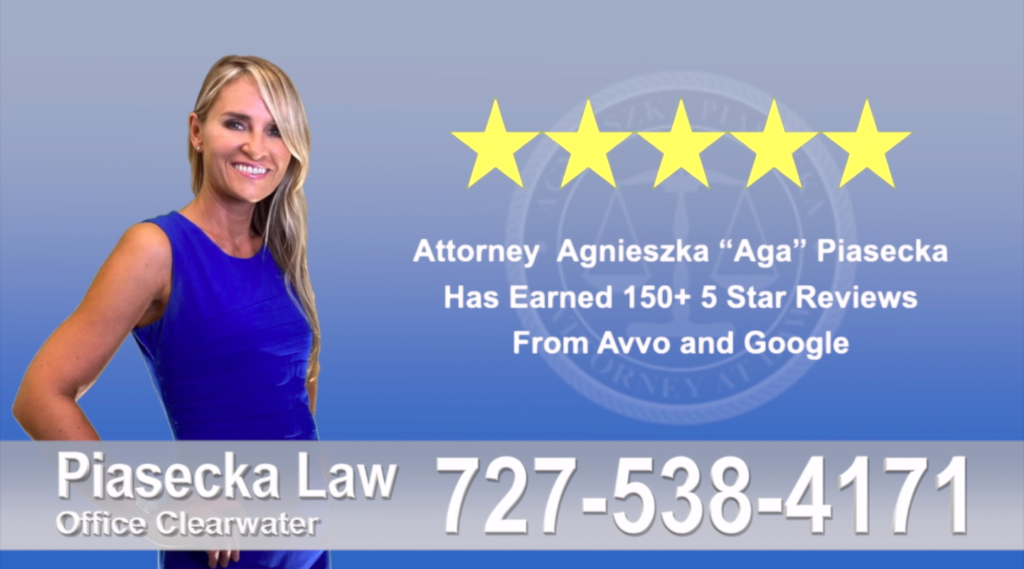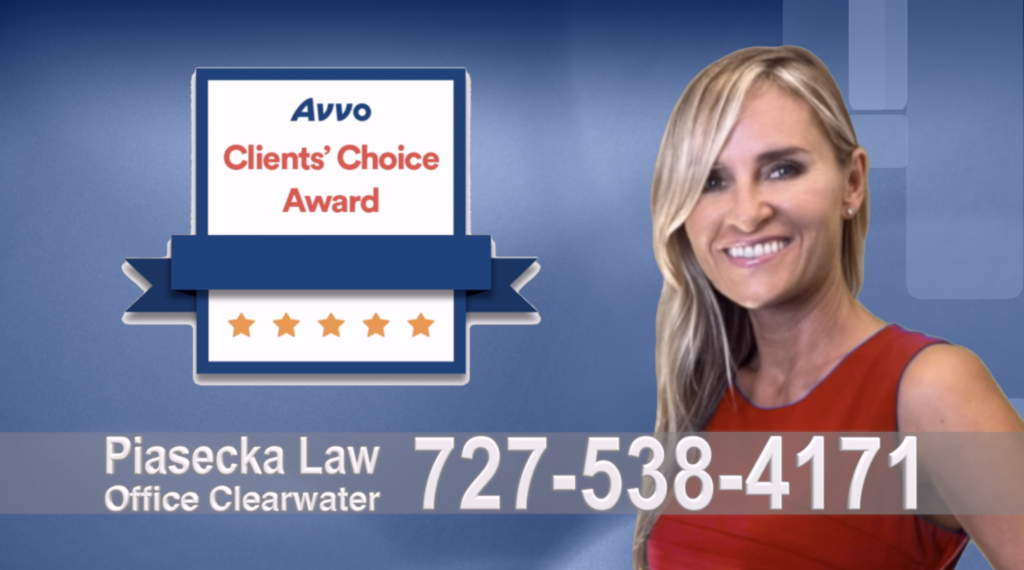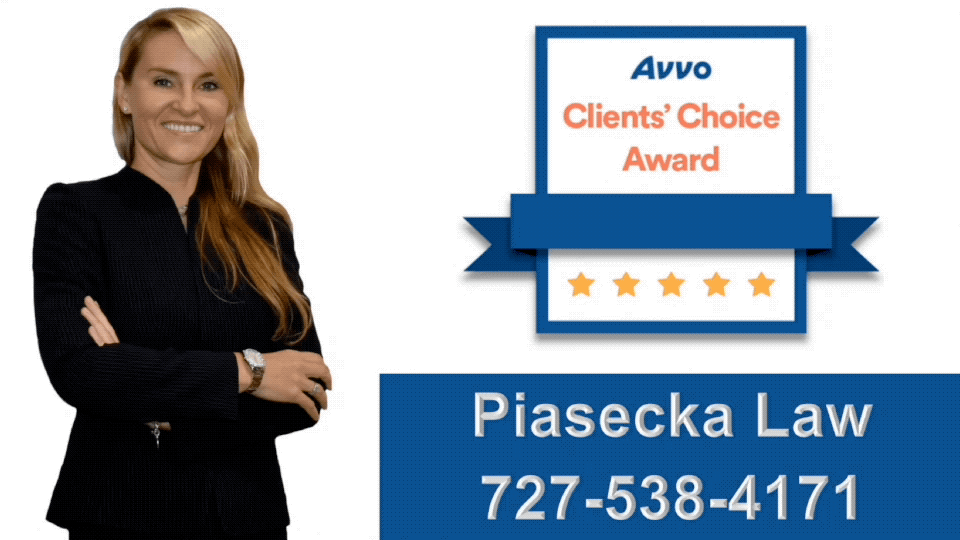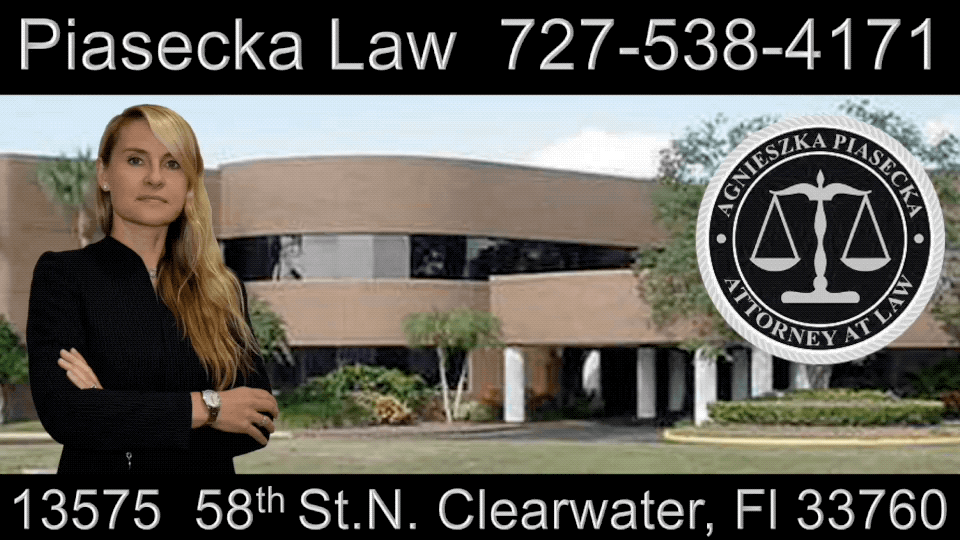Agnieszka “Aga” Piasecka
727-538-4171
813-786-3911
Office Location: 13575 58th St. N. Clearwater, Florida 33760
Clearwater Estate Planning Attorney
Attorney Agnieszka “Aga” Piasecka is an Estate Planning, Wills and Trust, Lawyer in Clearwater, Florida with more than 20 years of combined legal experience in Poland and Florida. Agnieszka speaks fluent Polish, Italian and English and is an Attorney in Florida and Poland. Attorney Agnieszka Piasecka obtained her Juris Doctorate Cum Laude from Stetson University College of Law in Florida and her Masters Degree in Law with Honors from Jagiellonian University in Poland. She also studied International Law in Holland. Attorney Agnieszka Piasecka is fluent in Polish, Italian and English and can assist you with your legal needs in Florida and Poland.
Free Consultations & Flat Rates
Aga offers Free Consultations and Flat Rates on creation of Wills and Trusts, Quit Claim Deeds and Powers of Attorney. Attorney Aga Piasecka’s Clearwater Law Office is conveniently located at 13575 58th Street North, Clearwater, Florida 33760 near the Saint Petersburg – Clearwater International Airport, Tampa International Airport, and the cities of Largo, New Port Richey, Tampa, Saint Petersburg, Sarasota and Bradenton, Florida.
Attorney Agnieszka “Aga” Piasecka has an excellent reputation in Florida and in Poland. As you can see by her reviews, Agnieszka Piasecka’s clients are consistently impressed by her performance in the courtroom and her knowledge of the law in Florida and in Poland.
Agnieszka Piasecka’s Client Reviews:
https://piaseckalaw.com/reviews
Agnieszka Piasecka’s Avvo Reviews:
https://www.avvo.com/attorneys/33760-fl-agnieszka-piasecka-4581259/reviews.html
Attorney Piasecka’s areas of practice include:
-
Probate
Probate is a court-supervised legal process, through which the assets of a deceased person are identified and distributed to the heirs or beneficiaries under a will or, if there is no will, pursuant to Florida probate law. A will typically appoints a personal representative to administer the estate. If the deceased left no will and there are assets to be probated, the estate of the decedent must be distributed pursuant to probate law.
Generally, the decedent’s assets are identified and gathered and they are first used to pay the costs of probate proceedings, then to pay the decedent’s debts, and the remainder is distributed to the decedent’s beneficiaries.
There are two types of probate proceedings in Florida:
1. A “Formal Administration” is filed when there are assets exceeding $ 75,000 and/or when it is necessary to appoint a representative to administer the estate.
2. A “Summary Administration” is filed when the value of the entire estate subject to probate administration does not exceed $ 75,000 and the appointment of a personal representative is not necessary.
There is also a non-court supervised administration proceeding called “Disposition of Personal Property Without Administration”. This type of probate administration applies only to limited circumstances and may be filed via informal petition to request release of the decedent’s assets to reimburse the person who paid the final expenses such as e.g. funeral costs, medical bills etc.
Probate proceedings may be lengthy and very expensive. The duration of legal proceedings depends on many factors but in general it may take from a few months up to a few years to administer one’s estate. During this time the decedent’s assets remain “locked” in the court proceedings and unavailable to heirs and/or beneficiaries. The typical costs of probate proceedings may be as high as several percent of the estate’s value. Moreover, probate proceedings are public record, which means there is no privacy assured when your estate goes through probate. Therefore, it is important to plan ahead in order to avoid probate whenever possible.
-
Last Will and Testament
A “last will”, also called “testament” is a written legal instrument, in which a person disposes of his or her property after death. Under Florida law, in order to be valid, a will must fulfill certain legal requirements. Wills must be validate by probate court in probate proceedings. After one’s death, a will must be admitted to probate court and go through probate proceedings. The custodian of the deceased’s original will, must file the will with the Clerk of the Court in the county where the decedent was domiciled, within 10 days after learning the person is deceased.
A will typically appoints a person to administer the deceased’s estate, so-called personal representative. If no personal representative has been named, it may be necessary for an attorney to file a petition with a court on behalf of the heirs, beneficiaries and other interested parties to a appoint a personal representative. Florida rules of law govern, who can become a personal representative and how will she or he be compensated.
-
Living Wills
A “living will” is a written legal instrument stating a person’s desires regarding his or her medical treatment and/or end-of-life medical care in case of serious illness when they are no longer able to express informed consent and communicate their decisions to physicians and medical personnel. It is also called a “health care directive” or “advance directive”. A “living will” is different than a regular will, in which a person expresses their desires regarding distribution of their assets after death. Unlike a will, a “living will” has no power after one’s death.
A “living will” is a very important document, which can give doctors and family members invaluable guidance with making critical decisions as to a choice of medical treatment when a person becomes seriously ill and can no longer give informed consent and communicate their preferences.
-
Health Care Directive
A “health care directive” also called “advance directive” to physicians is another name for a “living will”, in which a person states his or her desires regarding medical treatment preferences in case of serious illness, when they are no longer able to give informed consent and communicate their wishes.
-
Advance Directive
An “advance directive” is another term for a “living will” or “advance directive”, which is a written legal instrument, in which a person states his or her desires and preferences regarding medical treatment in case of serious illness, when they are no longer able to give informed consent and communicate their decisions.
-
Trusts
A “trust” is a legal arrangement regarding property, in which the creator of the trust (called Settlor) transfers ownership of assets into care of another person (called Trustee), who holds legal title to property of the settlor with equitable duties to administer it for the benefit of a third person (called Beneficiary). A settlor can be the same person as trustee and there can be more than one beneficiary of the trust. In order to form a valid trust, one must meet certain legal requirements. The document that establishes the responsibilities of the trustee and the rights of the beneficiaries is called the “trust”, “trust instrument” or “trust agreement”.
The main advantage of creating a trust (as opposed to a will) is to avoid probate proceedings and spare your beneficiaries the expense and delay of probate court proceedings after your death. Certain trusts can be also used for asset protection against creditors.
There are many different types of trusts including:
1. Living trusts
A living trust, also called inter vivos trust is created during the settlor’s lifetime . Living trusts can be either revocable or irrevocable.
a. Revocable trusts
The settlor remains in control and ownership of his or her assets and can be changed and terminated at any time. This type of trust does not provide protection against creditors but it is an excellent tool to dispose of your property after death by avoiding probate proceedings.
Once assets are transferred into the trust, they belong to the trust itself, and remain subject to the rules and instructions set up in the trust instrument. The trustee has a fiduciary duty to administer the trust funds accordingly for the benefit of trust beneficiaries. At settlors death, the trust assets pass directly to the beneficiaries and avoid probate proceedings.
b. Irrevocable trusts
Once the irrevocable trust is created, the settlor can no longer control trust assets, modify, change or revoke the trust instrument. Once a property is transferred to the irrevocable trust, no one, including the settlor, can remove the property out of the trust. Generally, this type of trust provides protection against creditors and assures that upon your death, your assets are passed to trust beneficiaries and not to your creditors. However, a court can sometimes invalidate an irrevocable trust if it finds that the trust was established with the intention of defrauding creditors. Therefore, it is important to plan for asset protection well before you even anticipate to be subject to any creditor claims.
2. Testamentary trusts
A testamentary trust, also called a “will trust” or a “trust under will” is set up in a will . A testamentary trust is established only after the settlor’s death, in which it differs from a living trust, which is created during the settlor’s lifetime.
3. Charitable trusts
A charitable trust is established with the intent to benefit a specific charity or general public rather than a private individual or entity. Charitable trusts are eligible for a favorable tax treatment and they are often established as part of an estate plan to lower or avoid imposition of estate and gift tax.
4. Spendthrift trusts
A spendthrift trust is created for the benefit of a person, who is often unable to manage money and control his or her spending and it gives a trustee an authority to make decisions as to how the trusts funds may be distributed and spent for the benefit of the beneficiary. Such a trust limits the beneficiary’s access to the trust funds and also provides protection against beneficiary’s creditors. The beneficiary is prohibited or restricted in assigning present or future income and/or principal in the trust to his or her creditors.
5. Discretionary trusts
A discretionary trust is a trust, in which a settlor has delegated nearly complete or limited discretion to the trustee to decide as to how the trust income and/or principal is distributed to beneficiaries.
6. Support trusts
A support trust is a discretionary trust, in which a trustee has discretion to pay the beneficiary as much income or principal as the trustee believes is needed for support or the beneficiary. The type of support can be determined by terms of trust e.g. “for comfortable support” or for “support in accordance with the beneficiary’s standard of living”. Such a trust provides the beneficiary with partial protection from creditors. The beneficiary’s interest cannot be voluntarily transferred or assigned and is unavailable to general creditors but creditors, who provide necessaries to the beneficiary can usually reach it.
7. Totten trusts
A totten trust, also called “POD (Payable Upon Death) Account” is a revocable trust created during the lifetime of the settlor by depositing his or her money into an account or financial institution, typically in a savings account, in the depositor’s name as trustee for another. An individual or an entity can be named as beneficiary. Upon the settlor’s death, the money passes directly to the beneficiary and avoids probate. A totten trust can be revoked at any time as the gift is not completed until the settlor’s death. A totten trust is commonly used to indicate a successor to the bank account without having to create a will.
8. Self-settled trusts
A self-settled trust is a type of trust, in which the settlor is also the beneficiary, i.e. the one, who receives benefits from the trust.
-
Power of Attorney
Aga offers flat rates on preparation of powers of attorney. A power of attorney is a written legal instrument that gives someone authority to act on another person’s (principal) behalf and represent him or her in private affairs business, medical, or some other legal matters
-
Medical Power of Attorney
Aga offers flat fees on preparation of medical powers of attorney. A medical power of attorney is a written legal instrument that allows you (principal) to appoint a person that will have authority to make medical decisions on your behalf in case you become unable to make them for yourself.
-
Quit Claim Deeds
Sometimes a Quit Claim Deed is the easiest solution. A quit claim deed transfers a grantor’s (owner’s) interest in a property to a recipient, or grantee.
-
Will contest
A will can be contested in probate court. Typically, the contestant has 90 days from the time of receiving a formal Notice of Administration to file pleadings contesting the will. If the Notice of Administration was received before the Will has been admitted to probate, then the time to contest the will is only 20 days. In Florida, the most common grounds, on which a will may be contested are:
A. Improper execution
In order for a will to be valid in Florida, the testator must be of sound mind and at least 18 years old. The statutory requirements for a valid will are set forth in Florida Statute 732.502, Execution of wills, and are the following:
Every will must be in writing and executed as follows:
(1)(a) Testator’s signature.-
1. The testator must sign the will at the end; or
2. The testator’s name must be subscribed at the end of the will by some other person in the testator’s presence and by the testator’s direction.
(b) Witnesses. – The testator’s:
1. Signing, or
2. Acknowledgment:
a. That he or she has previously signed the will, or
b. That another person has subscribed the testator’s name to it,must be in the presence of at least two attesting witnesses.
(c) Witnesses’ signatures.—The attesting witnesses must sign the will in the presence of the testator and in the presence of each other.
The witnesses and testator must all be contemporaneously in presence of each other at the time of signing. Florida does not recognize holographic wills, i.e. handwritten wills signed with no witnesses.
B. Incapacity
In order to make a valid will, the testator must have testamentary capacity at the time of signing the will. Florida courts held that testamentary capacity “does not depend upon a sound body but upon a sound mind.” In re Wilmott’s Estate, 66 So. 2d 465, 467 (Fla. 1953).The testator must be able to “mentally understand in a general way the nature and extent of the property to be disposed of, and the testator’s relation to those who would naturally claim a substantial benefit from the will, as well as a general understanding of the practical effect of the will as executed. Id. “A sick person may make a valid will in his last illness or even when in a dying condition” as long as they understand the nature of the undertaking as explained above. Id. “If he testamentary requisites are found, the will may be valid, although executed by one of great age, whose mind is enfeebled, whose body is debilitated, whose memory is failing or whose judgment is vacillating, especially where the will appears to have been fairly made, is not an unnatural one, and apparently was made under conditions not inconsistent with the inference that it emanated from a free mind.” Id. Therefore, it is worth noting that testamentary capacity is judged by a lower standard then mental capacity in general. Testamentary capacity is judged at the time of execution of the will. A person may lack capacity in general but may sign a will, while having a lucid moment and, therefore, posses testamentary capacity to make a will.
C. Undue influence
Undue influence may be found in situations, when the testator’s mind is controlled by “persuasion, coercion, or force that destroys or hampers the fee agency and will power of a testator.” Zinnser v. Gregory, 77 So. 2d 611, 613 (Fla. 1955)For a court to find presence of undue influence, “there must be active use of such influence for he purpose of securing the execution of the will to such an extent as to coerce the mind of the testator, so that it cannot be said that the testator was acting voluntarily of his or her own free will and volition.” Id.
D. Fraud
In Florida, a will is void if its execution is procured by fraud. The elements of fraud are: 1) a false statement as to a material fact; 2) the representator’s knowledge that the representation is false; 3) and intention to induce another to act on it; and 4) consequent injury by the person acting in reliance on the representation. Townsend v. Morton, 36 So. 3d 865, 867 (Fla. 5th DCA, 2010).
G. Duress
Duress is defined as a “condition of mind produced by an improper external pressure or influence that practically destroys free agency” of the testator. Herald v. Hardin, 95 Fla. 889, 891 (Fla. 1928). Therefore, the will is signed involuntarily and not as an exercise of free choice or will and this condition of mind was caused by some improper coercive conduct. City of Miami v. Kory, 394 So. 2d 494, 497 (Fla. 3rd DCA 1981). A will executed under duress is void.
Attorney Agnieszka “Aga” Piasecka offers Flat Fees for Estate Planning packages which include a Trust, Will, Deed, Power of Attorney and a Living Will in Clearwater, Florida.
For a free consultation please call:
727-538-4171
813-786-3911
Office Location: 13575 58th St. N. Clearwater, FL 33760
Agnieszka Piasecka’s Avvo Reviews:
https://www.avvo.com/attorneys/33760-fl-agnieszka-piasecka-4581259/reviews.html
Agnieszka Piasecka’s Client Reviews:
https://piaseckalaw.com/reviews
Office Location, By appointment only
13575 58th St N, Clearwater, FL 33760
Attorney Aga Piasecka’s Clearwater Law Office is conveniently located at 13575 58th Street North, Clearwater, Florida 33760 near the Saint Petersburg – Clearwater International Airport, Tampa International Airport, and the cities of Largo, New Port Richey, Tampa, Saint Petersburg, Sarasota and Bradenton, Florida.
Attorney Anieszka Aga Piasecka, is a Polish Lawyer, who speaks fluent Polish, Italian and English located in Clearwater, Florida near the cities of Saint Petersburg, Tampa, New Port Richey and Sarasota, Florida.
Aga offers Free Consultations and Flat Rates on creation of Wills and Trusts, Quit Claim Deeds and Powers of Attorney. Attorney Aga Piasecka’s Clearwater Law Office is conveniently located at 13575 58th Street North, Clearwater, Florida 33760 near the Saint Petersburg – Clearwater International Airport, Tampa International Airport, and the cities of Largo, New Port Richey, Tampa, Saint Petersburg, Sarasota and Bradenton, Florida.
Attorney Agnieszka “Aga” Piasecka can assist you with your Wills and Trusts Clearwater.
Attorney Agnieszka “Aga” Piasecka can assist you with your Wills and Trusts Tampa.
Attorney Agnieszka “Aga” Piasecka can assist you with your Wills and Trusts Tampa, Florida.
Attorney Agnieszka “Aga” Piasecka can assist you with your Wills and Trusts Largo.
Attorney Agnieszka “Aga” Piasecka can assist you with your Wills and Trusts Largo, Florida.
Attorney Agnieszka “Aga” Piasecka can assist you with your Wills and Trusts Clearwater Beach.
Attorney Agnieszka “Aga” Piasecka can assist you with your Wills and Trusts Clearwater Beach, Florida.
Attorney Agnieszka “Aga” Piasecka can assist you with your Wills and Trusts Saint Petersbug.
Attorney Agnieszka “Aga” Piasecka can assist you with your Wills and Trusts Saint Petersburg, Florida.
Attorney Agnieszka “Aga” Piasecka can assist you with your Wills and Trusts St Pete.
Attorney Agnieszka “Aga” Piasecka can assist you with your Wills and Trusts St Pete, Florida.
Attorney Agnieszka “Aga” Piasecka can assist you with your Wills and Trusts New Port Richey.
Attorney Agnieszka “Aga” Piasecka can assist you with your Wills and Trusts New Port Richey, Florida.
Attorney Agnieszka “Aga” Piasecka can assist you with your Wills and Trusts Port Richey.
Attorney Agnieszka “Aga” Piasecka can assist you with your Wills and Trusts Port Richey, Florida.
Attorney Agnieszka “Aga” Piasecka can assist you with your Wills and Trusts Sarasota.
Attorney Agnieszka “Aga” Piasecka can assist you with your Wills and Trusts Sarasota, Florida.
Attorney Agnieszka “Aga” Piasecka can assist you with your Wills and Trusts Bradenton.
Attorney Agnieszka “Aga” Piasecka can assist you with your Wills and Trusts Bradenton, Florida.
Attorney Agnieszka “Aga” Piasecka can assist you with your Wills and Trusts Brandon.
Attorney Agnieszka “Aga” Piasecka can assist you with your Wills and Trusts Brandon, Florida.
